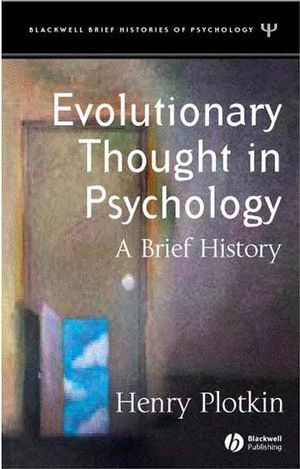Evolutionary Thought in Psychology: A Brief HistoryISBN: 978-1-4051-1377-9
Hardcover
184 pages
July 2004, Wiley-Blackwell
 This is a Print-on-Demand title. It will be printed specifically to fill your order. Please allow an additional 10-15 days delivery time. The book is not returnable.
Other Available Formats: Paperback
|
||||||
"In the 19th century, Darwin’s theory of evolution was
initially integrated into the new science of psychology by pioneers
such as Lloyd Morgan, George John Romanes, and James Mark Baldwin.
But in the 20th century it was as if their efforts had been wasted;
a self-names ‘science’ that insisted on ignoring
conscious experience itself, as well as any of its determinants
that might be of direct or indirect genetic origin, took over
academic departments of psychology. But Plotkin compellingly
describes how 21st century psychology, which will be about
consciousness as well as the brain, will probably incorporate
findings from ethology, sociobiology, and evolutionary theory
(including ideas about ‘selfish’ genes)…a
must-read." David J. Murray, Queen’s University
"This book is a true reflection of its title, a history of
evolutionary thought within psychology, building on Darwin's
original ambition to extend his theory to a science of the human
mind. It runs through the eclipse of this thinking by behaviourism
and its return in the last 20 years in the various forms of
evolutionary psychology. A very readable introduction to the
field." Scientific and Medical Network Review, Summer
2005
"Plotkin gives an erudite and engaging account of the
intellectual currents that influenced the relationship between
psychology and evolutionary thought over the past 100
years.....Interspersed throughout are interesting anecdotes,
colorful descriptions of personalities, and accounts of twists of
fate that affected careers and influenced the history of
psychology....For any psychologist interested in the history of
ideas -and how intellectual currents, politics and chance events
can affect scientific paradigms-it is a must read. It's lasting
value is that it provides a lucid and well-documented hisotry of
the intellectually shameful exculsion of evolutionary thought in
psychological theory during most of the 20th century. Thankfully,
that exclusion is being remedied in the 21st century." Personnel
Psychology, Summer 2005
`This is science writing of a high order, and I hope this book has the wide readership it so strongly merits.' Michael Ruse, Journal of the History of the Behavioural Sciences, Autumn 2005



